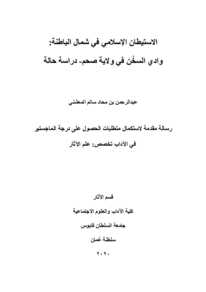Document
الإستيطان الإسلامي في شمال الباطنة : وادي السخن في ولاية صحم : دراسة حالة.
Other titles
Islamic occupation in the North of Al Batinah: Wadi As Sakhin in Wilayat Saham –Case Study
Publisher
جامعة السلطان قابوس.
Gregorian
2020
Language
Arabic
Subject
English abstract
The study shows the results of the survey and excavation processes conducted in 2019
in Wadi As Sakhin and its vicinities, which is located in the state of Saham. The
archaeological evidences found there, reveal richness of the site that indicates
occupation that spanned from pre-Islamic to the late and modern Islamic period, with
interruption of settlement in some locations during some Islamic periods due to some
circumstances .The archaeological survey revealed 23 archaeological sites belonging
to different periods, 20 of them inhabited during the Islamic periods. The early
Islamic period witnessed a growth in occupation activity, followed by a slight decline
in settlement activity during the medium Islamic period, while in the late and recent
Islamic period; the evidence indicates significant increase in settlement density. The
excavation also revealed four buildings and a copper melting oven, representing a part
of the Islamic settlement in Dahwa (DH7), which appear to be the remains of copper
mining workshops, which were built with stone foundations and in various ways.
The results of the archaeological survey and excavation in this area provided
important information on the organization, planning, location and economy of the
settlements in the various Islamic periods. The residents' economy of these
settlements depended mainly on agricultural production as evidenced by the
widespread agricultural fields in some settlements and the diversity of water sources
used to irrigate these fields, along with copper mining where copper mining mines
and workshops indicate that. There is also an evidence of communication of the
residents of Wadi As Sakhin with the residents of the coastal areas, where some shells
and fish bones were found in the building layers. Besides, there was also
communication with the residents of the interior where local pottery indicates this. On
the other hand, the pottery sherds of imported indicates a trade exchange with
neighboring regions such as Iraq , Iran, India and China during the various Islamic
periods, perhaps through Sohar, by virtue of being the closest central commercial city
to Wadi As Sakhin.
Member of
Resource URL
Arabic abstract
دراسة ميدانية وتحليلية للمستوطنات الإسلامية المكتشفة في وادي السخن والمناطق المجاورة لها أثناء عمليات المسح والتنقيب الأثري التي أجريت عام 2019م في هذه المنطقة التابعة لولاية صحم، وتهدف هذه الدراسة إلى تقديم وصفاً للمواقع الإسلامية المنتشرة في هذه المنطقة، وإبراز أهميتها في زيادة فهمنا للفترة الإسلامية التي تعود لها من خلال المواد المكتشفة، ووصف الأنواع المختلفة من المباني وأهميتها في كل موقع، والتعرف على أنماط الاستيطان، والملامح الاجتماعية والاقتصادية والسياسية لهذه الفترة.
واعتمدت هذه الدراسة على المنهج العملي والنظري، حيث يشمل المنهج العملي العمليات الميدانية كالمسح والتنقيب الأثري في وادي السخن، والعمل المخبري والمكتبي لتحليل البيانات، وذلك من أجل جمع المعلومات الميدانية وتوثيقها بالطرق المختلفة، كما تم إجراء تحليل ودراسة مقارنات للفخار الإسلامي المكتشف من العمل الميداني ومقارنتها مع قطع مشابهة من مواقع مختلفة تعود إلى الفترة نفسها.
واشتملت هذه الدراسة على مقدمة و خمسة فصول، إضافة إلى كاتلوج خاص بوصف الكسر الفخارية المختارة كعينة للدراسة، ورسومات وصور لهذه الكسر الفخارية.
تناول الفصل الأول من الدراسة مدخل عام للدراسة، وتطرق الفصل الثاني للحديث عن بعض المستوطنات الإسلامية في شمال الباطنة، وجاء الفصل الثالث للحديث عن المسح الأثري في وادي السخن والمناطق المجاورة له،
واعتمدت هذه الدراسة على المنهج العملي والنظري، حيث يشمل المنهج العملي العمليات الميدانية كالمسح والتنقيب الأثري في وادي السخن، والعمل المخبري والمكتبي لتحليل البيانات، وذلك من أجل جمع المعلومات الميدانية وتوثيقها بالطرق المختلفة، كما تم إجراء تحليل ودراسة مقارنات للفخار الإسلامي المكتشف من العمل الميداني ومقارنتها مع قطع مشابهة من مواقع مختلفة تعود إلى الفترة نفسها.
واشتملت هذه الدراسة على مقدمة و خمسة فصول، إضافة إلى كاتلوج خاص بوصف الكسر الفخارية المختارة كعينة للدراسة، ورسومات وصور لهذه الكسر الفخارية.
تناول الفصل الأول من الدراسة مدخل عام للدراسة، وتطرق الفصل الثاني للحديث عن بعض المستوطنات الإسلامية في شمال الباطنة، وجاء الفصل الثالث للحديث عن المسح الأثري في وادي السخن والمناطق المجاورة له،
Category
Theses and Dissertations

